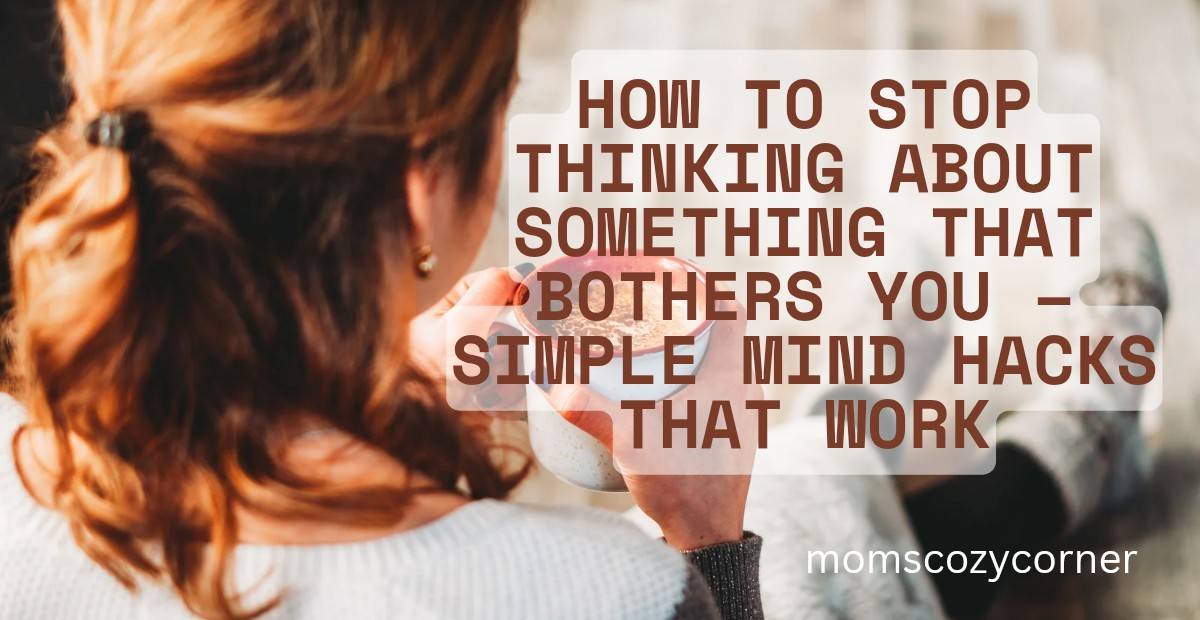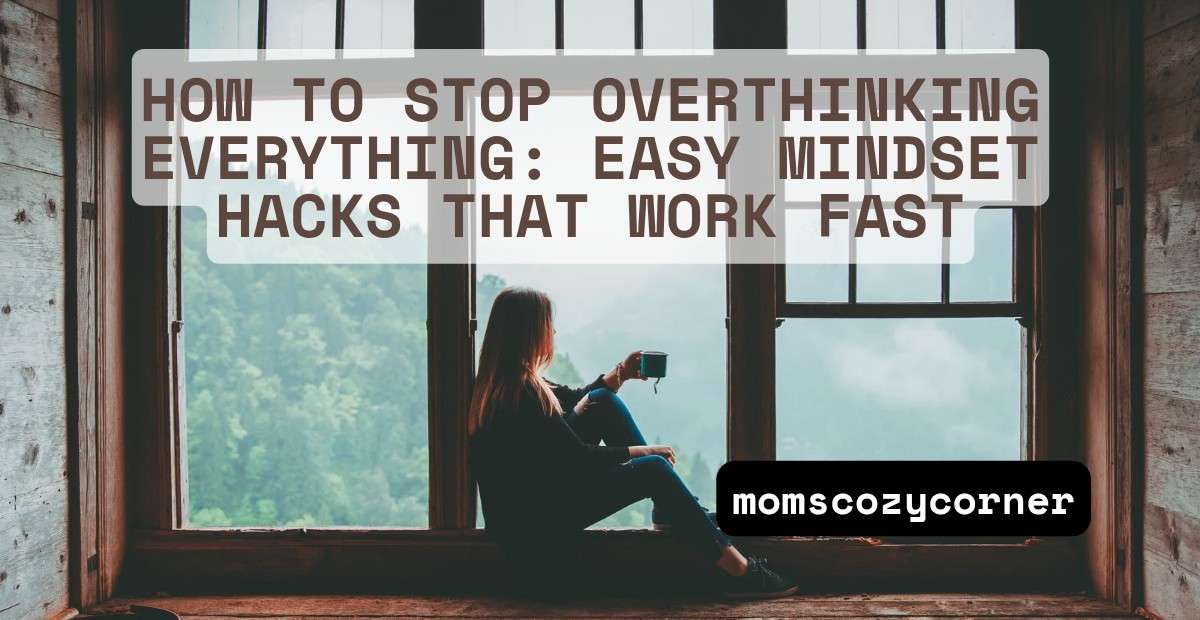How to Organize Your Thoughts and Feel Calm
Introduction
During busy mornings, various happenings occur simultaneously. While your daughter cries and your son demands star-shaped food, you try to recall if you had brushed your teeth. Yeah, it’s a lot. I have seen numerous American moms juggle multiple tasks while also trying to make mental space for themselves. Our minds produce disorganized thinking so quickly. Without proper consideration, our thoughts will only multiply into chaos. That mess grows unless we learn to organize our thoughts. Understanding how to control thought patterns turns out to be more than just something to practice but becomes essential guidance for everyday life.

So, what do I mean by “organizing thoughts”?
What I mean is not maintaining neat bullet-pointed entries or crafting sophisticated poems. It’s just… noticing. You need to notice the different worries inside your mind, such as analyzing past interactions or understanding daily mood changes. Look inside yourself to determine if you should focus your time and attention on the thought you are experiencing. Every day when I cut vegetables in the kitchen, I used to reflect on why things went wrong during morning duties. Taking a moment to pause gave me many opportunities to avoid repeating past negative thoughts. That’s organizing. That’s clarity.
Why Organizing Your Thoughts Matters for SAHMs
Stay-at-home moms have both their greatest guidance and biggest stressors within their minds. When your mind remains unstructured, you will react more strongly with anger and guilt, causing both you and your children to feel the consequences.
This real experience happened in my daily life:
First thing each morning, my spouse stayed on the couch checking his phone as I worked fast to dress our daughters. On many mornings my patience ran out due to his refusal to take action. Those arguments made our morning routine negative for everyone. My daughters remained silent, but they silently begged me with their eyes. Their confused expressions and internal struggle were clear for me to see. During that moment it became clear that my attempts to make him change were not solving our problems. It was just hurting us more. Organizing my own thoughts was. I decided to drop my efforts to change him and focused on making our morning routine better. A simple change in my way of thinking entirely transformed our mood.
Organizing your thoughts helps you:
- Stop unnecessary emotional drain.
- Make better parenting decisions.
- Present yourself with better understanding and reduce your anger.
- Doing your routine requires extra care for your mental well-being.
When and How Can You Organize Your Thoughts?
A basic journal and peaceful meditation are not needed to manage your thoughts. My strongest self-calming moments emerge during these routines.
- Chopping veggies
- Washing dishes
- Taking a shower
- Folding laundry
I have labeled these activities as my mental cleansing events. Time between tasks lets me think about my daily actions.
- What triggered me today?
- Which better steps could I take tomorrow?
- How will I take steps to enhance tomorrow’s situation?
A real example? During the entire morning I lost my temper with my little daughter. She cried and clung to me. That evening I figured out our problems began when I declined to answer her breakfast query because I was focused on my mobile device. A single action shaped how she would experience the rest of her day. I paid my daughter full attention when she got up, and things improved immediately.
Recording Your Thoughts Helps You Reset
When you sense hectic thoughts taking over your mind, write them down to gain control. Not in a fancy planner—just raw. Messy. Honest. It’s one of the most effective ways to organize your thoughts. Writing about specific factors that created turmoil or calmness helps you plan better for upcoming days.
When I examined my actions, I saw I was in a rush to get my daughter ready for school every morning. Putting my thoughts on paper allowed me to spot my daily routines better. I made sure to wake my daughter 10 minutes before our previous alarm time. Overall, my self-awareness grew from this experience. It’s not about perfection. It’s about gentle improvement.
Set Mental Boundaries Like You Do at Home
Let’s get real. You would never let dirty footwear into your bedroom. Your mind serves as your personal sanctuary, so why would you let negative emotions enter it?
I live in a joint family. Despite taking care of two babies and an injured husband, I received criticism from family members for providing inadequate support to my father-in-law during his recovery from surgery. Their words hurt. I decided not to invite them into my heart space. I decided to reduce their presence in my ideas instead of erasing them completely.
Creating mental boundaries lets you stay calm no matter what situation you face.
How Thought Organization Helps in Relationships
U.S. SAHMs need to handle household tasks plus monitor family emotions simultaneously. Through personal experience, I realized how important it is to organize your thoughts—especially when emotions run high. That’s when I truly learned the power of boundaries. You can’t change someone else. Not your husband’s habits. Not your in-laws’ opinions.
When you attempt to alter someone, it takes away your own energy. When you adjust your mental reaction, you gain back your authority. My response turned negative when my better half delayed tasks and stayed online. After learning how to handle my responses, the relationship developed better while both my husband and I felt better.

Daily Thought Organization Tips for USA SAHMs
1. Devote the first two minutes of your morning to assess your thought patterns.
Tell yourself which concerns keep popping up when you wake up.Firmly choose which tasks come first and release control over things you cannot change.
2. Select a relaxing routine to perform during cleaning tasks
You can clear your mind during kitchen tasks and laundry activities.
3. Create a “Let It Go” List
At night, write down two situations you prefer not to stress about tomorrow.
4. Reframe Negative Thoughts
Declare each time you fail to perform at your expected level as an opportunity to discover yourself better next time.
5. Protect Your Peace
Distance yourself mentally from people who stress you through their words or conduct.
Final Thoughts
Honestly, I’m still learning. I handle my tasks skillfully on many days. Other days, I mess up. My reactions get harsh, and my thinking goes wild while guilt builds inside me. The most useful thing I understand right now is that taking time to step back and organize my thoughts enables me to handle situations better. I respond better. I mother better. I breathe easier.
My reflection on daily events focuses not just on what failed but also on what succeeded. I take note of everyday achievements that feel simple and tasks that turn out smoothly. The activities that succeed and satisfy me most should remain my priorities.
Your thinking requires no absolute precision to become effective. All you need to better approach your tasks is awareness plus some recent progress. Life goes on after every spill and tear, no matter who caused them first. Take the first genuine step forward and continue to develop from there.




